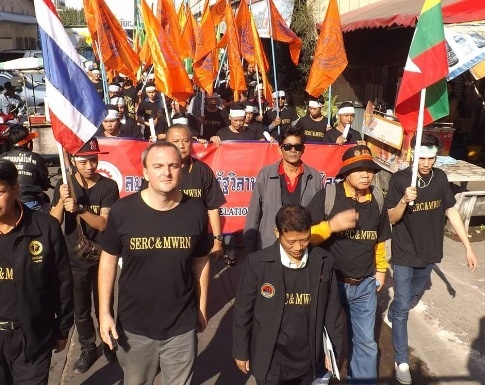The first of four defamation charges brought against British activist Andy Hall by Thailand’s Natural Fruit Company was dismissed by a Bangkok court on Wednesday due to a legal technicality.
The judges ruled that, as the incident – an interview given to Al Jazeera – had occurred abroad, Thailand’s attorney-general should have been involved in the investigation, and was not. The prosecution had therefore not proceeded within the law, it was ruled.
“I think this is a real victory for migrant workers and for the Thai justice system,” Hall told DVB after leaving court on Wednesday morning. “I think that the judges showed very clearly that they respected what I did and the work I did, and that they respected the role of human rights defenders. They categorically condemned the acts of the law enforcement officials and prosecutors who unlawfully prosecuted this case against me.
“It is a great ruling for me, for migrant workers, for labour rights and for freedom of expression,” he said, adding that this verdict strengthens the rule of law in Thailand.
“I never had any doubt that this ruling would go against me. I always had faith in the Thai justice system, I believe that I will win the rest of the cases against me,” he said by telephone.
The trial for a second civil defamation case starts on 30 October, Hall’s 35th birthday.
Natural Fruit filed four criminal and civil charges against Hall. Charges concern criminal and civil defamation claims, and crimes under Thailand’s Computer Crimes Act.
[related]
Hall successfully faced the first of four libel charges against him for his research about a Thai company’s alleged abuse of migrant labourers, the majority of whom are Burmese. He has been facing a total of at least seven years in prison for related charges.
Hall is being sued by Natural Fruit, a pineapple processing company based in Thonburi, Bangkok province. Wednesday’s case involved statements he made during an Al Jazeera video report that went live in June 2013.
The comments made to Al Jazeera implicate the company in unlawfully low wages and employment of underage workers. Natural Fruit employs hundreds of mostly Burmese migrants, who make up a significant portion of Thailand’s low-skill workforce and are widely regarded as vulnerable to labour abuse.
Natural Fruit’s Vice-president Kachin Komneyawanich, the plaintiff in the case, claims that the allegations were completely fabricated, and that the company’s revenues have dropped by a large margin since the content was published.
Hall’s is a unique and convoluted case, which has been lambasted by rights defenders and industry figures alike, claiming that he is being targeted to demonstrate that some issues and industries are off limits. The total of four charges – which include criminal defamation, violation of Thailand’s controversial Computer Crimes Act (CCA) and a civil defamation suit seeking damages of US$10 million – all trace back to research conducted for a European accountability watchdog, Finnwatch.
Finnwatch contracted Hall, who at the time was associate researcher at Bangkok’s Mahidol University, to investigate three Thai food processing companies that supply European markets: Thai Union Manufacturing, Unicord and Natural Fruit. The group published the findings in 2013, which were based largely on site visits and interviews with employees.
The damning report, titled Cheap Has a High Price, cited worker testimony claiming abuses including child labour, confiscation of passports, low wages and severely unsafe conditions. The allegations were taken seriously by some European retailers and ultimately resulted in several supplier contract re-negotiations.
Natural Fruit, however, dismissed the findings entirely. The company initially chose to pursue legal action under the CCA, enacted in 2007, which broadly criminalises all “forged computer data or false computer data”. While the law is generally thought to have been drafted to prevent physical or proprietary damage to computer systems, research by an independent Thai legal organisation, iLaw, shows that fraud and defamation cases are its most common application.
“All of the workers said to me that working there was like hell,” Hall said in the clip, which is still viewable on YouTube and was played back several times to the court on 2 September. This line drew particular ire from Natural Fruit, whose counsel fixated on the connotations of the word “hell”. The defense maintains that the statement was based on employee testimony and that Hall had no intent to harm the company.
I think it’s very difficult to prove that I had a malicious intent toward this company,” said Hall, speaking before the hearing. “What I did was in the public interest and what I did was for the benefit of migrant workers.”



